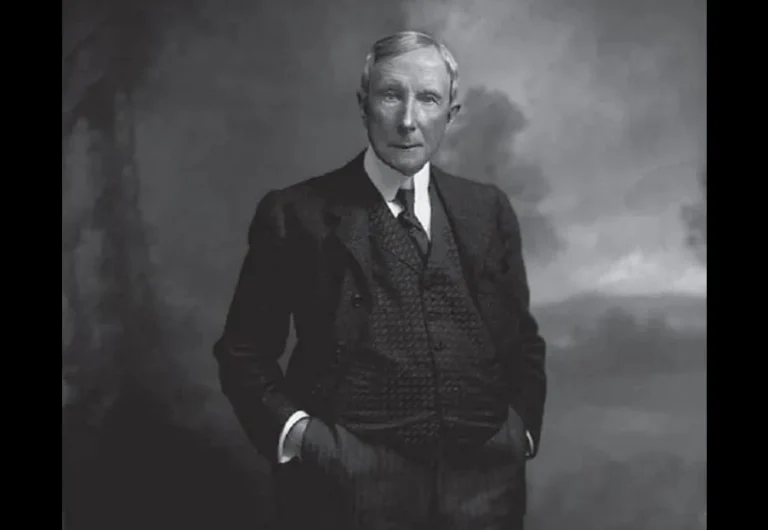John Davison Rockefeller was an American industrialist and philanthropist who played a pivotal role in the establishment of the U.S. oil industry. Born on July 8, 1839, in Richford, New York, Rockefeller went on to become the founder of Standard Oil, the largest oil refinery of its time. Through his innovative business practices and ruthless monopolistic strategies, Rockefeller built an empire that positioned him as one of the wealthiest individuals in history.
Over the course of his career, Rockefeller not only changed the way oil was produced and sold but also set new standards in philanthropy, giving away more than half a billion dollars during his lifetime. Despite being a controversial figure, especially due to his business tactics, Rockefeller’s legacy is a mixture of immense industrial success and pioneering charitable work.
Early Life and Education
John D. Rockefeller was born into a modest family. His father, William Avery Rockefeller, was a traveling salesman with a dubious reputation, while his mother, Eliza Davison Rockefeller, was a deeply religious woman who instilled in John the importance of saving and discipline. From a young age, Rockefeller exhibited a natural aptitude for numbers and entrepreneurship.
At the age of 16, he secured his first job as an assistant bookkeeper, earning $50 for three months of work. This experience laid the foundation for his later business endeavors, teaching him about commerce, financial management, and investments. His early life was characterized by a strong work ethic and an innate ability to seize opportunities, traits that would serve him well in his career.
Timeline of Key Events in Rockefeller’s Life
| Year | Event |
| 1839 | Birth of John D. Rockefeller |
| 1855 | First job as an assistant bookkeeper |
| 1870 | Co-founds Standard Oil |
| 1882 | Standard Oil Trust established |
| 1911 | Standard Oil dissolved by U.S. Supreme Court |
| 1937 | Death of John D. Rockefeller |
The Birth of Standard Oil
In 1870, John D. Rockefeller, along with his brother William, Henry Flagler, and others, founded the Standard Oil Company in Cleveland, Ohio. At the time, the oil industry was chaotic, with many small companies producing oil inefficiently. Rockefeller, a firm believer in efficiency and economies of scale, saw an opportunity to dominate this growing industry.
Under his leadership, Standard Oil rapidly expanded, acquiring smaller oil companies and controlling nearly all aspects of production, from extraction to refining and distribution. By the 1880s, Standard Oil controlled approximately 90% of the oil refining business in the United States.
Standard Oil’s Business Strategy
Rockefeller employed several innovative business strategies to grow his empire. One of the key strategies was horizontal integration, where Standard Oil bought out competitors to control the entire market. He also practiced vertical integration, gaining control of the entire supply chain, from oil extraction to transportation and sales.
By negotiating preferential rates with railroads and buying out competitors, Rockefeller eliminated inefficiencies in the market, which allowed him to lower prices and outcompete other companies. These practices, though effective, earned him a reputation for being ruthless and monopolistic.
Rockefeller’s Business Strategies
| Strategy | Description |
| Horizontal Integration | Acquisition of competing oil companies |
| Vertical Integration | Control of the entire oil production and distribution chain |
| Economies of Scale | Reducing production costs by increasing output |
| Preferential Rates | Negotiating special rates with railroads |
The Creation of the Standard Oil Trust
In 1882, Rockefeller created the Standard Oil Trust, a legal arrangement that allowed him to control numerous companies under a single corporate umbrella. This structure enabled him to operate a virtual monopoly over the oil industry. The trust format allowed Rockefeller to bypass certain state regulations that sought to curb monopolistic practices.
Standard Oil’s dominance was so complete that by 1885, it had achieved near-total control over oil refining, transportation, and marketing in the United States. However, this success also attracted government scrutiny, leading to accusations of anti-competitive practices.
Philanthropy and Legacy
Despite his controversial business methods, Rockefeller was one of the most generous philanthropists of his time. Throughout his life, he donated an estimated $540 million to various causes, including education, medical research, and public health.
One of his most notable contributions was the founding of the University of Chicago in 1890, which he supported with over $80 million in donations. He also established the Rockefeller Foundation in 1913, which focused on addressing global health, scientific research, and social issues. The foundation played a significant role in the development of vaccines, including those for yellow fever and meningitis.
Major Philanthropic Contributions
| Institution | Year Founded | Amount Donated (in millions) |
| University of Chicago | 1890 | $80 |
| Rockefeller Institute for Medical Research | 1901 | $100 |
| Rockefeller Foundation | 1913 | $250 |
The Dissolution of Standard Oil
By the early 20th century, the U.S. government began taking action against monopolies, with Standard Oil being the prime target. In 1911, following a lengthy legal battle, the U.S. Supreme Court ordered the dissolution of Standard Oil, ruling that the company had violated the Sherman Antitrust Act.
The company was broken up into 34 smaller companies, many of which later became some of the most prominent oil companies in the world, including ExxonMobil, Chevron, and BP America. Despite the breakup, Rockefeller’s fortune continued to grow as the shares in the newly created companies increased in value.
Standard Oil Successor Companies
| New Company | Current Name |
| Standard Oil of New Jersey | ExxonMobil |
| Standard Oil of California | Chevron |
| Standard Oil of Ohio | BP America |
Rockefeller’s Personal Life
John D. Rockefeller married Laura Celestia Spelman in 1864, and they had five children together. Despite his immense wealth, Rockefeller was known for leading a relatively modest lifestyle. He was deeply religious and believed in the virtues of hard work and thrift.
Rockefeller lived to be 97 years old, passing away on May 23, 1937. At the time of his death, he was worth an estimated $1.4 billion, which would be equivalent to around $26 billion today.
FAQs About John D. Rockefeller
1. How did John D. Rockefeller become so wealthy?
Rockefeller’s wealth primarily came from his control of Standard Oil, which dominated the oil industry through innovative business strategies such as horizontal and vertical integration. He leveraged economies of scale and negotiated favorable terms with railroads to drive competitors out of the market.
2. What was the Standard Oil Trust?
The Standard Oil Trust was a legal entity created by Rockefeller to control multiple oil companies under one umbrella, allowing him to manage a vast network of businesses while evading certain regulations.
3. How much did John D. Rockefeller donate to charity?
Throughout his life, Rockefeller donated more than $540 million to charitable causes, focusing on education, medical research, and public health. His most notable contributions include founding the University of Chicago and the Rockefeller Foundation.
4. What impact did John D. Rockefeller have on modern business?
Rockefeller’s business strategies, particularly his use of monopolistic practices, led to the creation of U.S. antitrust laws. His focus on efficiency, cost reduction, and philanthropy also influenced modern corporate governance and charitable giving.
5. What happened to Standard Oil after its breakup?
After the U.S. Supreme Court ordered the dissolution of Standard Oil in 1911, the company was divided into 34 smaller entities. Many of these entities became leading oil companies, such as ExxonMobil and Chevron.


